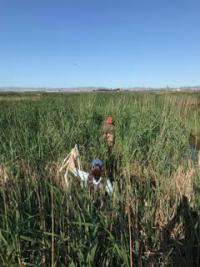This project aimed to quantify the impacts of common reed (Phragmites australis) invasion on community structure and ecosystem function during early stages of tidal restoration projects in wetlands. The study focused on Northern California’s Tule Red Tidal Restoration site in Suisun Marsh, where the invasion and expansion of Eurasian Phragmites threatens to reverse the ecological benefits of restoration efforts. Phragmites is a tall grass that grows rapidly in disturbed areas and creates dense stands of vegetation impenetrable to fish and wildlife.
The long-term effects of invasive Phragmites are not clear, and it is difficult to distinguish “bad” versus “good” impacts to the habitat. Not only is it not feasible to eradicate the species, it might also be unnecessary. Phragmites supports a similarly diverse, although slightly less abundant, source of invertebrates food resources compared with native wetland plants, and provides refuge from the effects of extreme heat for these food resources.

Future managers will need to consider habitat fragmentation, not eradication, when it comes to Phragmites mitigation. The cost of removing this species is extremely high, and it is not even feasible on this scale.
Instead, the team recommends that monocultures of Phragmites are fragmented using strategic native plant restoration so that species can still seek refuge from climate phenomena under Phragmites canopies, but ecosystem services by diverse native plants are not lost completely.
They also recommend this approach because Phragmites still poses a threat to filling in lower order tidal channels, which reduces habitat availability for fishes and foraging area for birds.
Lastly, the team will provide a strategic communication toolkit to agencies soon to inform stakeholders of these recommendations.
Attachments
 Richelle Tanner
Richelle Tanner
